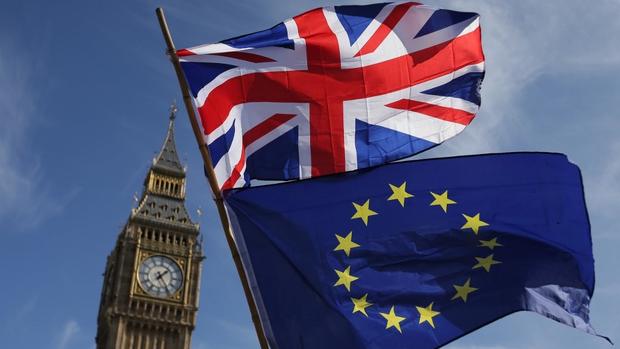 In this file photo taken on March 25, 2017, an EU flag and a Union Jack flag held by a demonstrator (not in frame) is seen with the Big Ben in the background, in central London, Britain. (DANIEL LEAL-OLIVAS / AFP)
In this file photo taken on March 25, 2017, an EU flag and a Union Jack flag held by a demonstrator (not in frame) is seen with the Big Ben in the background, in central London, Britain. (DANIEL LEAL-OLIVAS / AFP)
The European Union launched legal action against the UK in a major escalation of tensions between the two sides less than three months after Brexit was formally completed.
It follows Britain’s unilateral decision to delay implementing a key part of the Brexit deal relating to Northern Ireland. The move could ultimately lead to financial penalties or trade tariffs being imposed on the UK.
The dispute is likely to worsen the already fraught relationship between the two sides that has led to disagreements over the export of COVID-19 vaccines and the UK refusing to grant full rights to the bloc’s ambassador in London
The dispute is likely to worsen the already fraught relationship between the two sides that has led to disagreements over the export of COVID-19 vaccines and the UK refusing to grant full rights to the bloc’s ambassador in London. The post-Brexit trade deal the two sides signed on Dec 24 still hasn’t been formally ratified by the EU despite it taking effect on Jan 1.
An EU official told reporters in Brussels on Monday that the bloc considered the UK’s actions an enormous problem and raised doubts about the government’s commitment to the Northern Ireland part of the Brexit agreement. The official said he hoped the government would hold talks with the commission to come up with joint solutions and draw a line under the legal action.
ALSO READ: Britain delays Brexit import checks to avert supply disruption
The commission is still deliberating whether to grant UK financial firms greater access to the bloc under a so-called regulatory equivalence decision. While there is no formal link between that decision and Monday’s legal action, there will be a joined-up response, said the official, who asked not to be identified because the process is private.
Under the Brexit deal, Northern Ireland effectively stayed in the EU’s customs union and single market. This avoided the need for border checks on the island of Ireland, but introduced them for the first time on goods coming into the province from Great Britain, leading to delays and disruption.
Protocol Pressure
Prime Minister Boris Johnson has come under increasing pressure from members of his own party, as well as unionist politicians in Northern Ireland, to renegotiate the Brexit deal’s Northern Ireland Protocol.
Last month, the UK said it would temporarily waive rules set begin on April 1 that would have required firms sending food between Great Britain and Northern Ireland to provide additional customs paperwork -- a move the commission warned violated the terms of the Protocol. Britain also plans similar delays in other areas, including checks on parcels.
ALSO READ: Britain to ease listing rules to buttress London after Brexit
The UK is committed to the Northern Ireland protocol, but wants to see areas of concern addressed, Johnson’s spokesman Jamie Davies told reporters on a call on Monday. The measures the government has taken are “temporary” and “operational” steps designed to “minimize disruption,” he added.
The commission launched infringement proceedings under EU law, the official said. That means it can ultimately ask for a ruling from the European Court of Justice, which could impose financial penalties. Despite the ECJ’s influence in the UK being a bone of contention in the campaign in the run-up to the 2016 Brexit referendum, the government accepted a role for the EU court in the treaty.
Lengthy Process
The commission is also taking action under the dispute resolution mechanism of the treaty itself, which could eventually see the establishment of an arbitration panel and -- if the UK lost -- could potentially see the suspension of part of its overall trade deal with the EU, or tariffs imposed.
Both options could take well over a year to reach a conclusion and officials on both sides have said they want to reach a settlement before getting as far as the imposition of penalties.
The commission previously initiated infringement proceedings against the UK after Johnson’s government announced plans in September to override part of the Protocol. These were dropped when the government backed down shortly before the trade deal was signed in December.
READ MORE: EU, UK near post-Brexit accord on finance regulation forum


